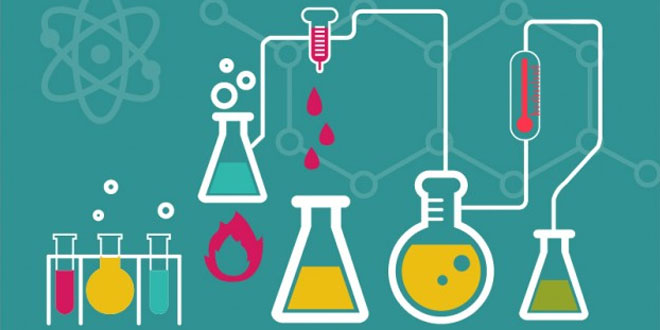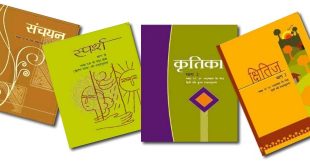10th Class CBSE Science Annual Exam: 2017-18
M.M.: 80
Class: 10th
Subject: Science
General Instructions:
- The Question paper comprises two Section – A and B. You are to attempt both the sections.
- All questions are compulsory.
- All questions of Section A and Section B are to be attempted separately.
- There is an internal choice in three questions of three marks each, two questions of five marks each in Section A and one question of two marks in Section B.
- Question numbers 1 and 2 in Section A are one mark questions. They are to be answered in one words or in one sentence.
- Question numbers 3 to 5 in Section A are two marks questions. These are to be answered in about 30 words each.
- Question numbers 6 to 15 in Section A are three marks questions. These are to be answered in about 50 words each.
- Question numbers 16 to 21 in Section A are five marks questions. These are to be answered in about 70 words each.
- Question numbers 22 to 27 in Section B are based on practical skills. Each question is a two marks question. These are to be answered in brief.
Section A
Question: 1. A Mendelian experiment consisted of breeding pea plants bearing violet flowers with pea plants bearing white flowers. What will be the result in F progeny? [1]
Question: 2. Write the energy conversion that takes place in a hydro-power plant. [1]
Question: 3. A compound ‘X’ on heating with excess conc. Sulphuric acid at 443 K gives an unsaturated compound ‘Y’. ‘X’ also reacts with sodium metal to evolve a colorless gas ‘Z’. Identify ‘X’, ‘Y’ and ‘Z’. Write the equation of the chemical reaction of formation of ‘Y’ and also write the role of sulphuric acid in the reaction.
Question: 4.
- Name one gustatory receptor and one olfactory receptor present in human beings.
- Write a and b in the given flow chart of neuron through which information travels as an electrical impulse.
Dendrite → a → b → End point of Neuron.
Question: 5. If the image formed by a spherical mirror for all positions of the object placed in front of it is always erect and diminished, what type of mirror is it? Draw a labelled ray diagram to support your answer.
Question: 6. Decomposition reactions require energy either in the from of heat or light or electricity for breaking down the reactants. Write one equation each for decomposition reactions where energy is supplied in the form of heat, light and electricity.
Question: 7. 2 mL of sodium hydroxide solution is added to a few pieces of granulated zinc metal taken in a test tube. When the contents are warmed, a gas evolves which is bubbled through a soap solution before testing. Write the equation of the chemical reaction involved and the test to detect the gas. Name the gas which will be evolved when the same metal reacts with dilute solution of a strong acid.
Or
The pH of a salt used to make tasty and crispy pakoras is 14. Identify the salt and write a chemical equation for its formation. List its two uses.
Question: 8.
- Why are most carbon compounds poor conductors of electricity?
- Write the name and structure of a saturated compound in which the carbon atoms are arranged in a ring. Give the number of single bonds present in this compound.
Question: 9. Name the hormones secreted by the following endocrine glands and specify one function of each: (a) Thyroid (b) Pituitary (c) Pancreas.
Question: 10. Write one main difference between asexual and sexual mode of reproduction. Which species is likely to have comparatively better chances of survival the one reproducing asexually or the one reproducing sexually? Give reason to justify your answer.
Question: 11. State the laws of refraction of light. Explain the term ‘absolute refractive index of a medium’ and write an expression to relate it with the speed of light in vacuum.
Or
What is meant by power of a lens? Write its SI unit. A student uses a lens of focal length 40 cm and another of 20 cm. Write the nature and power of each lens.
Question: 12. Show how would you join three resistors, each of resistance 9 Ω so that the equivalent resistance of the combination is (i) 13.5 Ω, (ii) 6 Ω?
Or
- Write Joule’s law of heating.
- Two lamps, one rated 100 W; 220 V, and the other 60 W; 220 V, are connected in parallel to electric mains supply. Find the current drawn by two bulbs from the line, if the supply voltage is 220 V.
Question: 13. (a) List the factors on which the resistance of a conductor in the shape of a wire depends.
(b) Why are metals good conductors of electricity whereas glass is a bad conductor of electricity? Give reason.
(c) Why are alloys commonly used in electrical heating devices? Give reason.
Question: 14. Students in a school listened to the news read in the morning assembly that the mountain of garbage in Delhi, suddenly exploded and various vehicles got buried under it. Several people were also injured and there was traffic jam all around. In the brain storming session the teacher also discussed this issue and asked the students to find out a solution to the problem of garbage. Finally they arrived at two main points – one is self management of the garbage we produced and the second is to generate less garbage at individual level.
- Suggest two measures to manage the garbage we produce.
- As an individual, what can we do to generate the least garbage? Give two points.
- List two values the teacher instilled in his students in this episode.
Question: 15. What is a dam? Why do we seek to build large dams? While building large dams, which three main problems should particularly by addressed to maintain peace among local people? mention them.
Question: 16.
- Write the steps involved in the extraction of pure metals in the middle of the activity series from their carbonate ores.
- How is copper extracted from its sulphide one? Explain the various steps supported by chemical equations. Draw labelled diagram for the electrolytic refining of copper.
Question: 17.
- The modern period table has been evolved through the early attempts of Dobereiner, Newland and Mendeleev. List one advantage and one limitation of all the three attempts.
- Name the scientist who first of all showed that atomic number of an elements is more fundamental property than is atomic mass.
- State Modern periodic law.
Question: 18.
- Mention any two components of blood.
- Trace the movement of oxygenated blood in the body.
- Write the function of valved present in between atria and ventricles.
- Write one structural difference between the composition of artery and veins.
Or
- Define excretion.
- Name the basic filtration unit present in the kidney.
- Draw excretory system in human beings and label the following organs of excretory system which perform following functions:
(i) form urine.
(ii) is a long tube which collects urine from kidney.
(iii) store urine until it is passed out.
Question: 19.
- Write the function of following parts in human female reproductive system:
(i) Ovary (ii) Oviduct (iii) Uterus - Describe in brief the structure and function of placenta.
Question: 20. A student is unable to see clearly the written on the black board placed at a distance of approximately 3 m from him. Name the defect of vision the boy is suffering from. State the possible causes of this defect and explain the method of correcting it.
(b) Why do stars twinkle? Explain.
Or
- Write the function of each of the following parts of human eye:
(i) Cornea (ii) Iris
(iii) Crystalline lens (iv) Ciliary muscle - Why does the sun appear reddish early in the morning? Will this phenomenon be observed by an astronaut on the Moon? Give reason to justify your answer.
Question: 21.
- State Fleming’s left hand rule.
- Write the principle of working of an electric motor.
- Explain the function of the following parts of an electric motor:
(i) Armature
(ii) Brushes
(iii) Split ring
 Class Notes NCERT Solutions for CBSE Students
Class Notes NCERT Solutions for CBSE Students






